Your driveway is more than just a path to your garage. It’s the first thing guests see when they visit your home. But how thick should it be? And why does this matter so much? This article will answer those questions and more.
You’ll learn exactly what thickness works best for your driveway. We’ll also explain why getting this right saves you money in the long run.
Here’s what we’ll cover: why thickness matters for your driveway, how durability affects your wallet, and what experts recommend for different situations. We’ve helped hundreds of homeowners make smart choices about their driveways.
Our team has seen what works and what fails. I’ve personally overseen countless installations and witnessed the difference proper thickness makes.
Trust comes from experience, and we’re sharing that knowledge with you. Stop guessing about driveway thickness. Get the facts you need to make the right choice for your home.
Standard Thickness Guidelines
Getting the right thickness for your driveway isn’t complicated. But it does matter more than most people think.
Residential Driveways
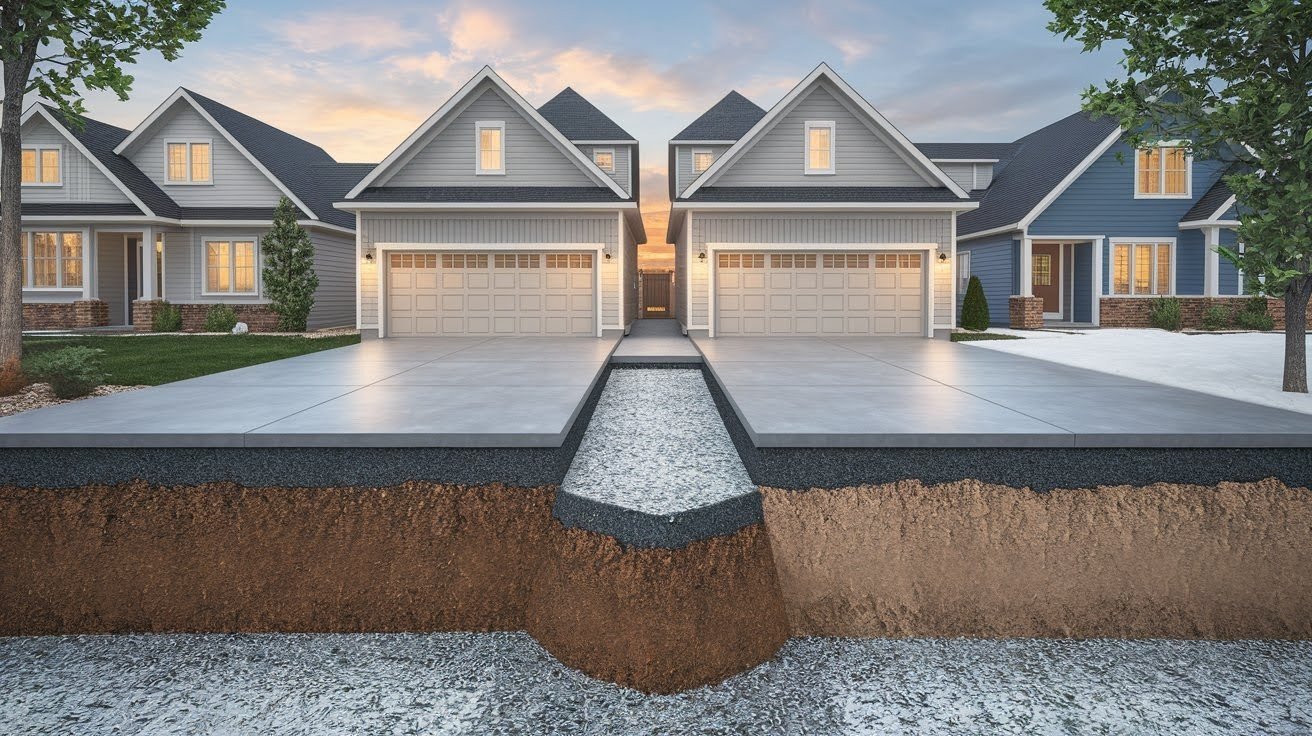
Most home driveways work fine with 4 inches of concrete. This handles regular cars, SUVs, and light trucks without problems.
But sometimes you need more. Go with 5 inches if you have:
- Heavier vehicles like large pickup trucks
- Soft or clay soil underneath
- Areas that freeze and thaw often
- Plans to park boats or trailers occasionally
The extra inch costs a bit more upfront. But it prevents cracks and repairs later.
Heavy-Duty Driveways
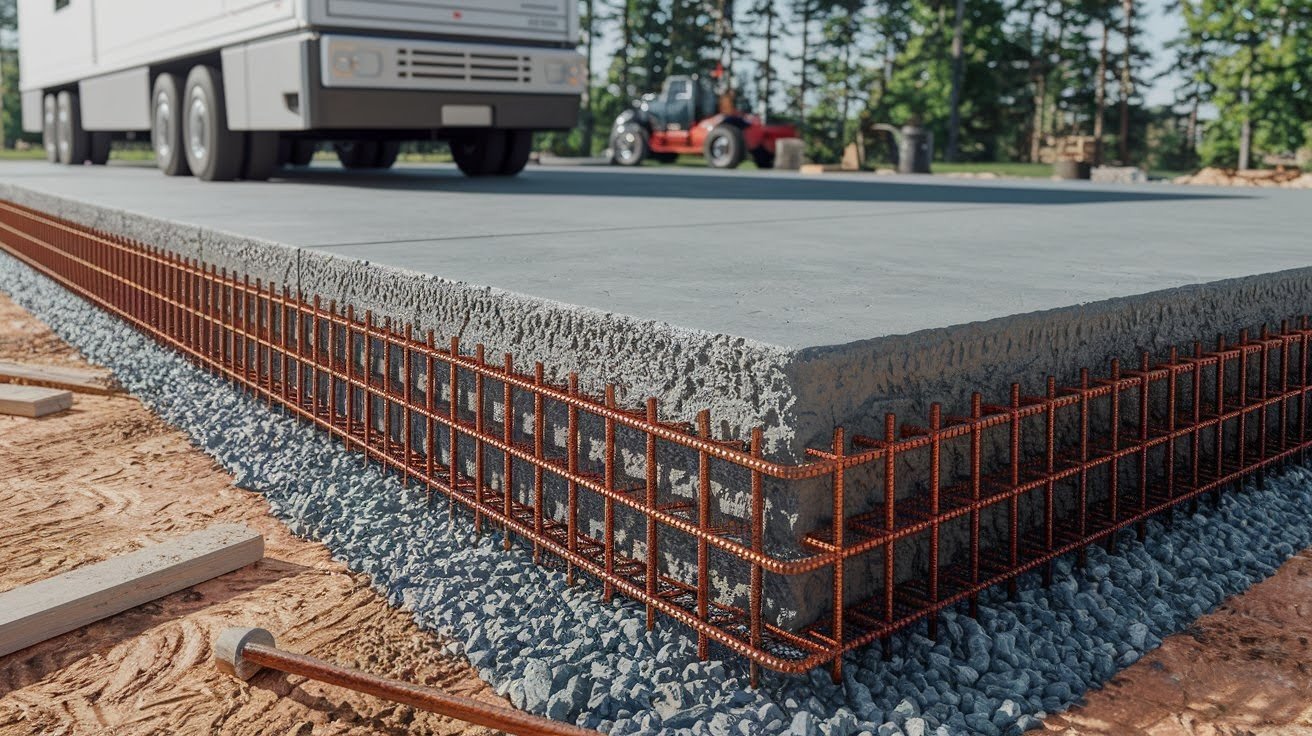
Some driveways need to handle serious weight. RVs, delivery trucks, and commercial vehicles require stronger construction.
For these situations, use 6 inches or more. You’ll also want:
- Steel reinforcement bars (rebar)
- Wire mesh for extra strength
- Proper base preparation underneath
- Thicker edges where weight concentrates
Don’t cut corners on heavy-duty driveways. The extra cost now prevents major headaches later. A failed driveway replacement costs far more than doing it right the first time.
Key Factors That Affect Thickness
Your driveway thickness isn’t a one-size-fits-all decision. Several factors determine what works best for your specific situation.
Vehicle Load
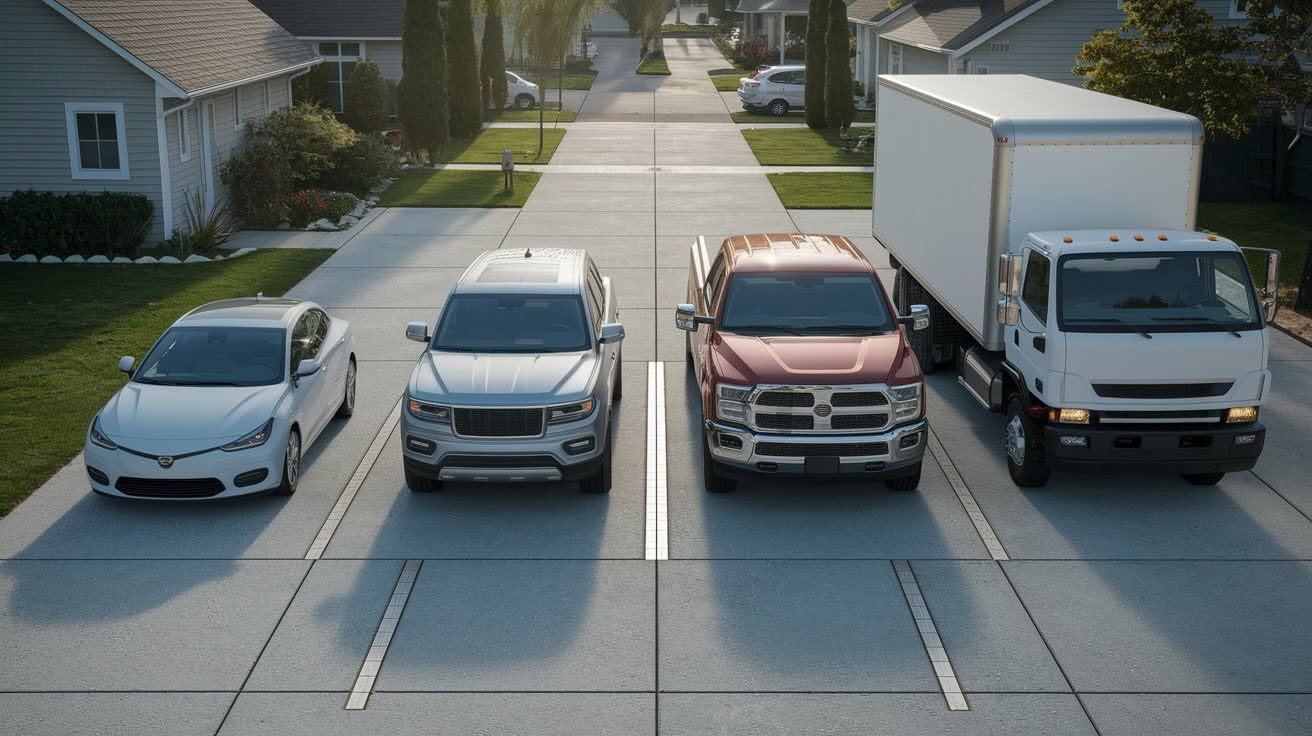
The weight of your vehicles makes a huge difference. A compact car puts far less stress on concrete than a loaded pickup truck.
Think about what you park regularly:
- Family cars and small SUVs – standard thickness works fine
- Large trucks and work vehicles – you need extra strength
- Occasional heavy loads like moving trucks – plan ahead
Frequency matters too. A delivery truck that visits once a month creates less wear than daily heavy traffic. Be honest about your usage patterns when planning thickness.
Soil and Subgrade Quality
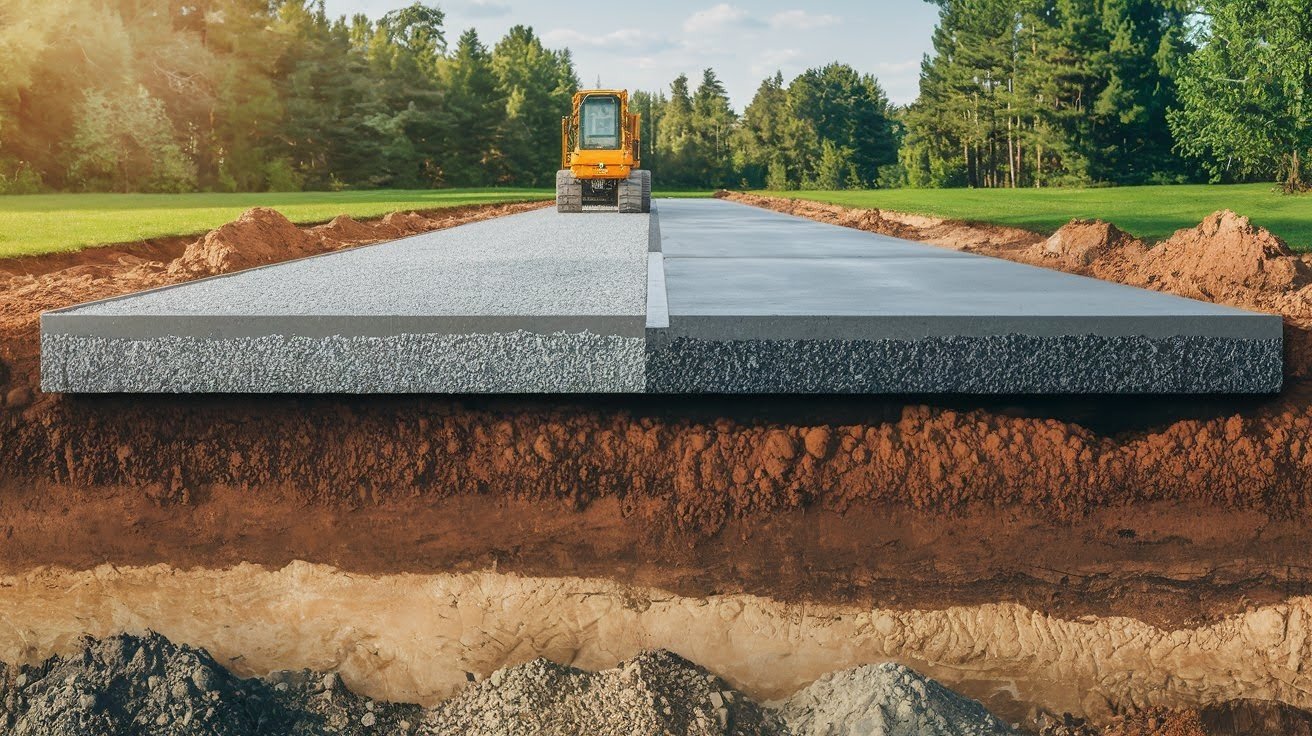
What sits under your concrete determines how much support it gets. Good soil means less thickness needed. Poor soil requires more concrete to prevent settling and cracking.
Base preparation is critical. Proper grading and compaction create a solid foundation.
Soft or shifting soils need special attention:
- Clay soils that expand when wet
- Sandy areas that don’t compact well
- Fill dirt that hasn’t settled completely
Skip the base prep, and even thick concrete will fail.
Climate and Weather
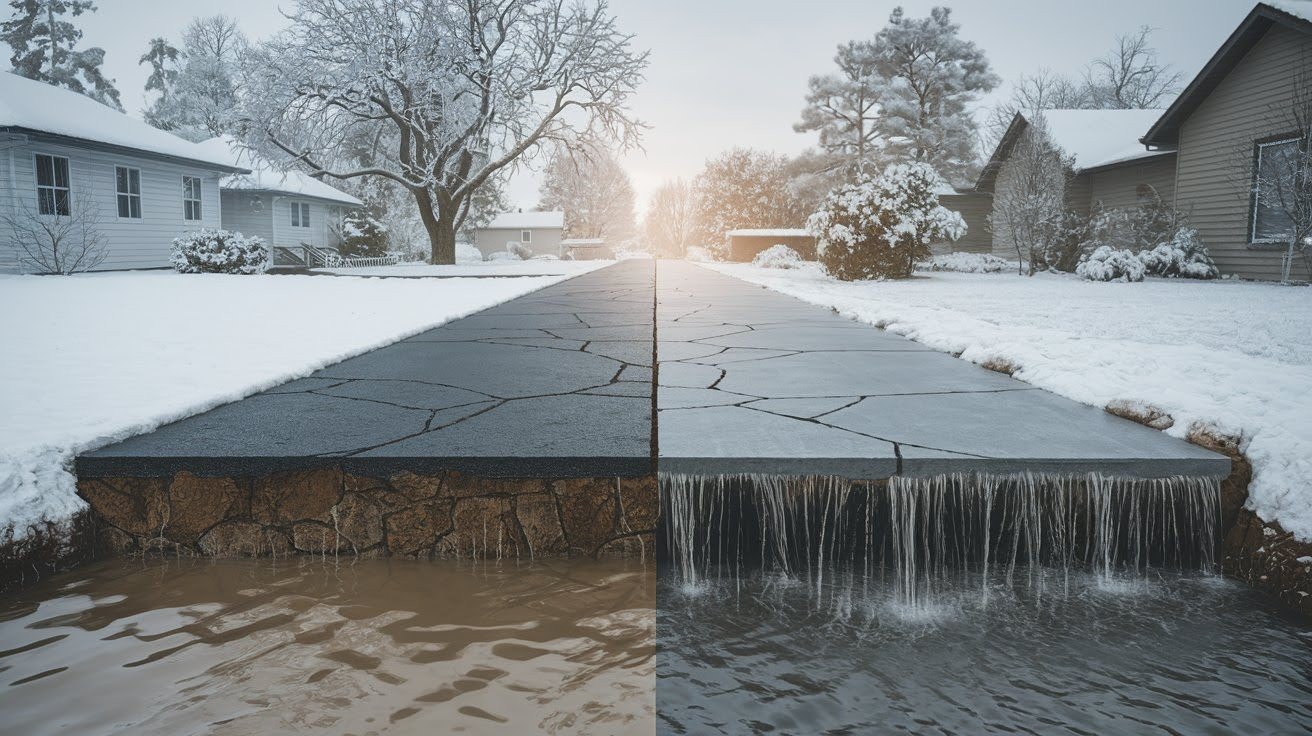
Your local weather patterns affect how concrete performs over time.
Freeze-thaw cycles are particularly hard on driveways. Water gets into small cracks, freezes, and expands. This creates bigger cracks and eventual failure.
Heavy rainfall and poor drainage also cause problems. Standing water weakens the base and creates erosion underneath the concrete.
Consider your climate when choosing thickness. Harsh conditions require stronger construction.
Reinforcement and Materials
Thickness alone doesn’t guarantee a strong driveway. The right reinforcement and concrete mix make all the difference.
Rebar or Wire Mesh
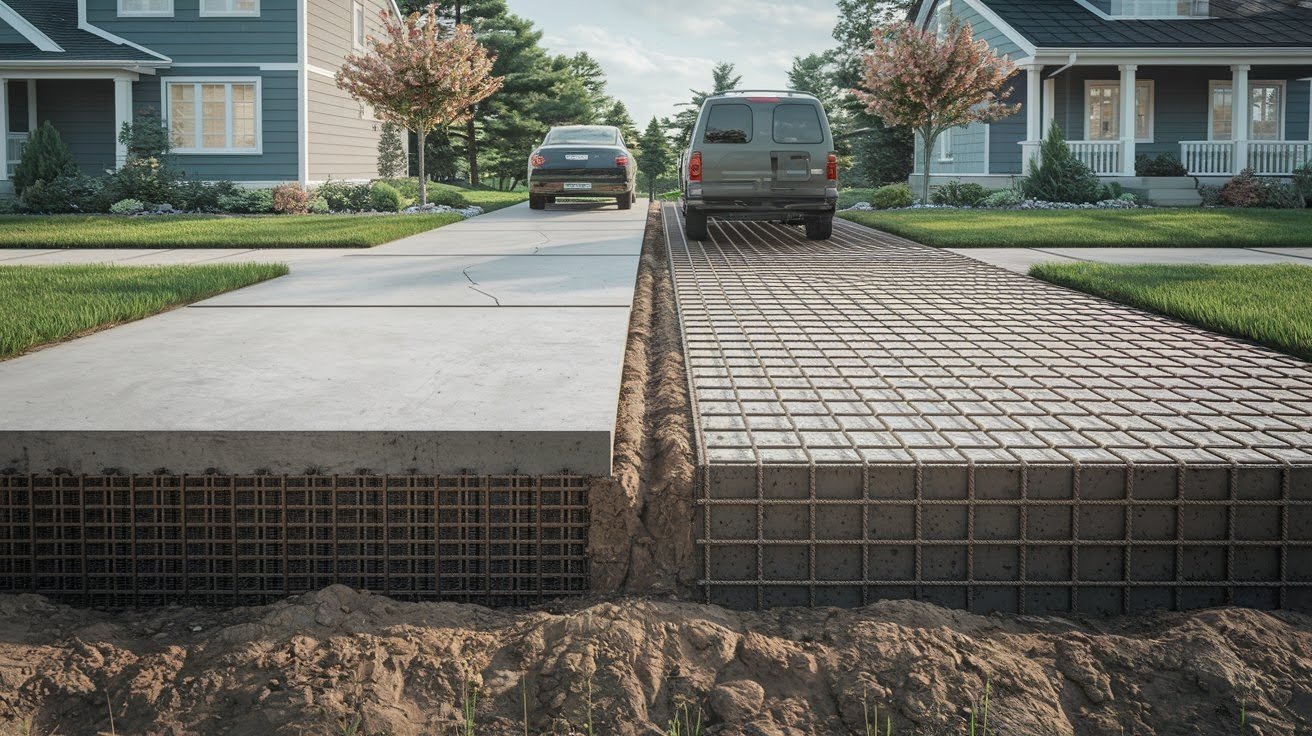
Not every driveway needs reinforcement. But when you do need it, don’t skip this step.
Use reinforcement when you have:
- Heavy vehicle traffic regularly
- Driveways longer than 20 feet
- Areas with poor soil conditions
- Slopes or uneven ground
Rebar works best for serious reinforcement needs. These steel bars handle heavy loads and prevent major cracking. Wire mesh costs less and works well for standard residential driveways.
The benefits add up over time. Reinforced concrete lasts years longer than plain concrete. It handles stress better and develops fewer cracks. Small repairs stay small instead of becoming major problems.
Think of reinforcement as insurance. It costs extra now but saves money on repairs later.
Concrete Mix Strength
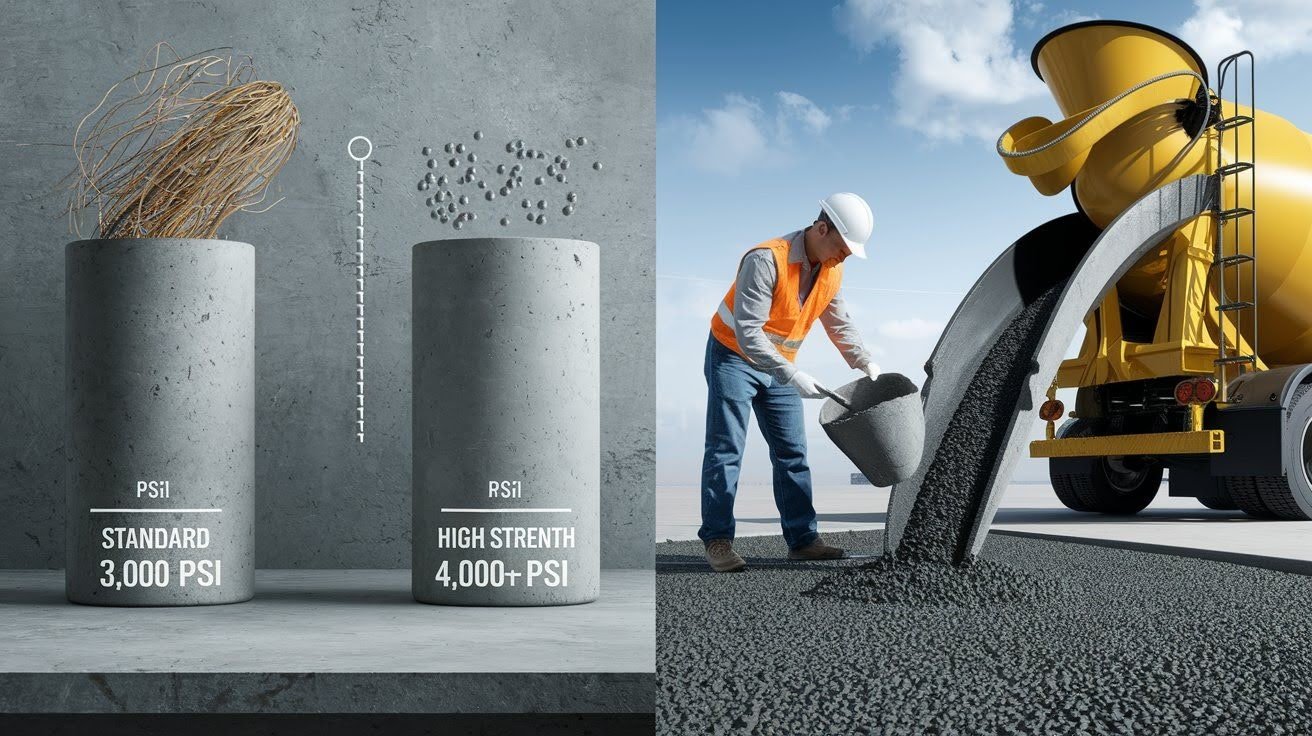
Not all concrete is the same. The mix strength determines how well your driveway holds up.
For driveways, use concrete with at least 3,000 PSI strength. Heavy-duty applications need 4,000 PSI or higher. This number tells you how much pressure the concrete can handle before failing.
Some additives improve performance:
- Air entrainment helps concrete survive freeze-thaw cycles
- Fiber reinforcement reduces small cracks
- Water reducers make stronger, denser concrete
Talk to your concrete supplier about these options. The right mix for your situation prevents problems down the road.
Installation Tips for Long-Lasting Results
Getting the thickness right is just part of the equation. How you install your driveway determines whether it lasts 10 years or 30 years.
Proper Base Compaction
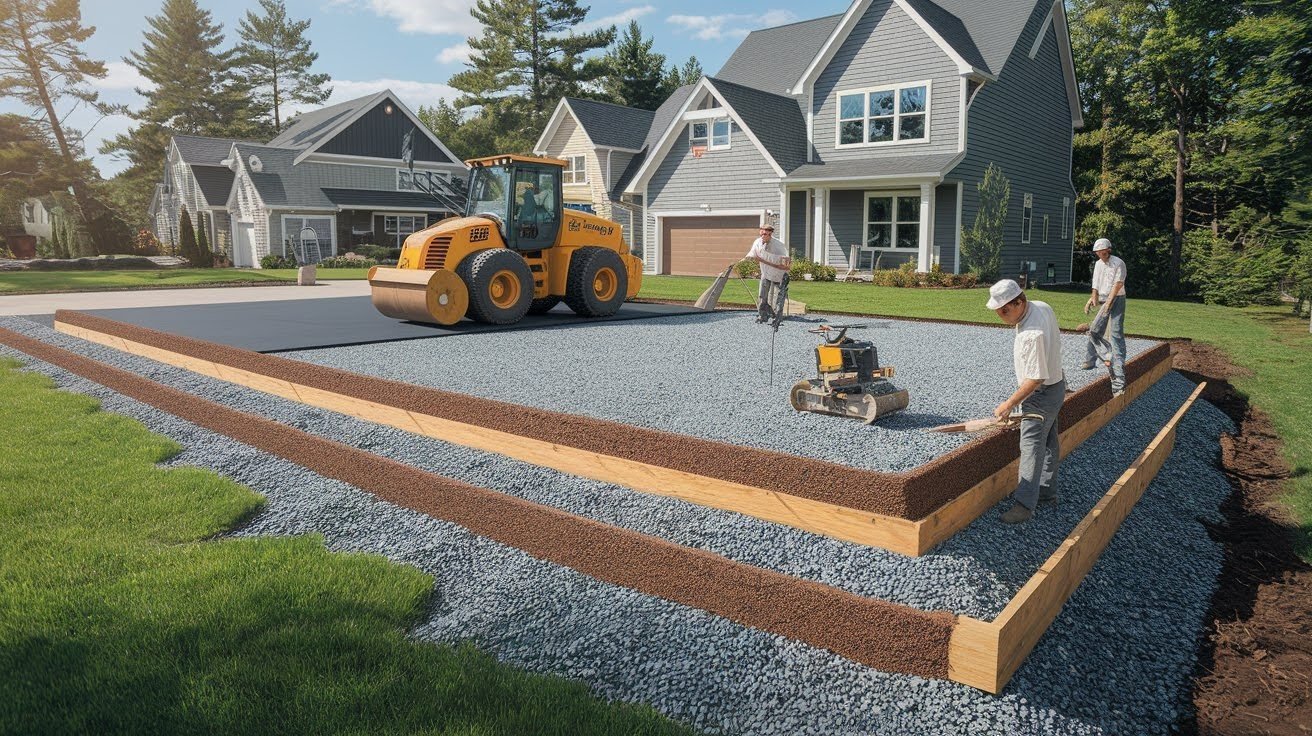
The ground under your concrete needs to be rock solid. Loose or uneven base material leads to cracks and settling later.
Start by removing all grass, roots, and soft soil. Add gravel in 4-inch layers and compact each one thoroughly. Use a plate compactor or hire professionals with heavy equipment.
Don’t rush this step. A poorly compacted base will cause problems no matter how thick your concrete is. The extra time spent here pays off for decades.
Test your base by walking on it. It should feel firm with no soft spots or movement. Any areas that give under pressure need more work.
Slope and Water Runoff
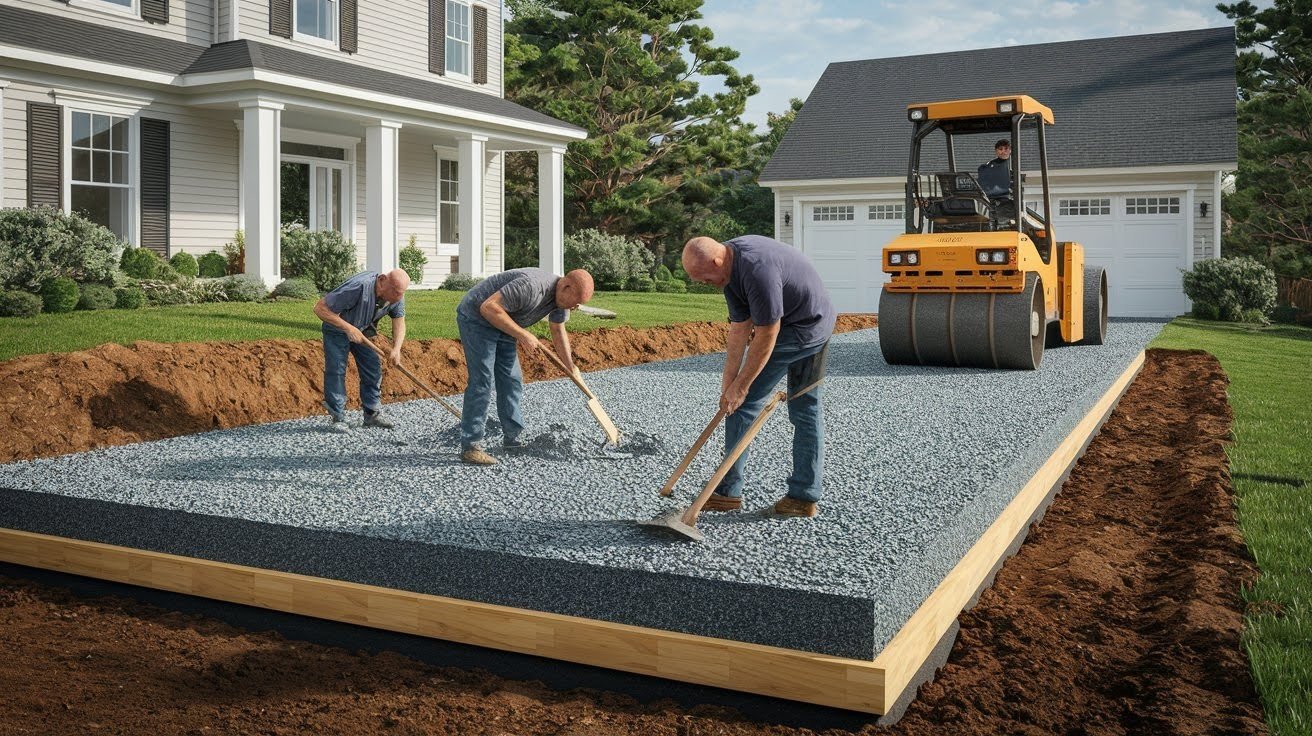
Water is concrete’s biggest enemy. Standing water causes cracks, erosion, and early failure.
Your driveway needs proper slope to move water away quickly. Plan for at least 1/4 inch of fall per foot of length. This creates enough flow without making the slope too steep for vehicles.
Direct water toward grass areas or storm drains. Never let it pool against your house foundation or in low spots on the driveway.
Consider where water goes during heavy rains. Plan drainage before you pour concrete, not after problems develop.
Curing Process Essentials
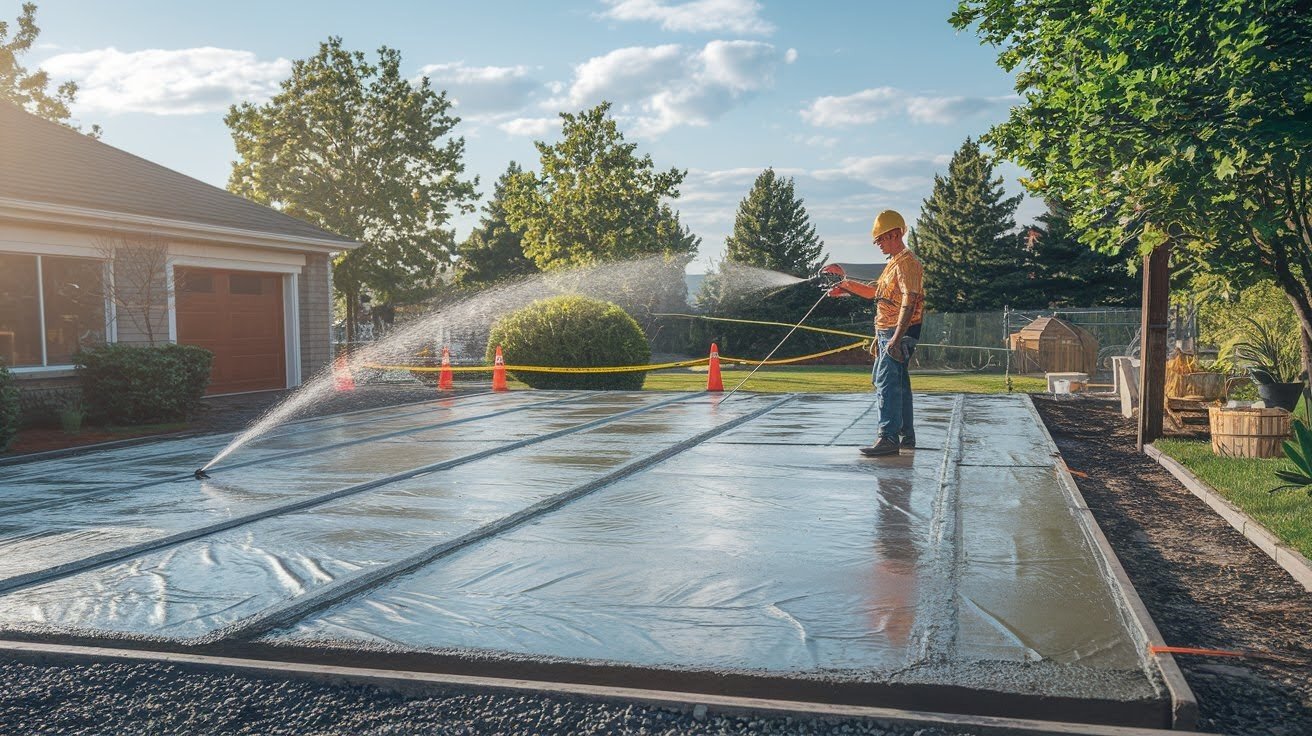
Fresh concrete needs time and moisture to reach full strength. Rush the curing process and you’ll pay for it later.
Keep concrete damp for at least 7 days after pouring. Cover it with plastic sheeting or spray it with water regularly. Hot, windy weather dries concrete too fast and weakens it.
Don’t drive on new concrete for at least 7 days. Wait longer for heavy vehicles. The concrete continues gaining strength for weeks after installation.
Patience during curing creates a driveway that lasts decades. Rushing leads to weak concrete that cracks and crumbles early.
Here are 5 key tips for a long-lasting driveway:
- Choose the right thickness for your needs: Use 4 inches for regular cars, 5 inches for heavier vehicles, and 6+ inches for RVs or commercial trucks.
- Invest in proper base preparation: Remove all soft soil and compact gravel in 4-inch layers. A solid foundation prevents settling and cracking later.
- Add reinforcement when needed: Use rebar for heavy-duty applications or wire mesh for standard driveways. This prevents major cracks and extends lifespan significantly.
- Plan for water drainage: Create proper slope (1/4 inch per foot) to move water away quickly. Standing water causes cracks and early concrete failure.
- Allow proper curing time: Keep concrete damp for 7 days and avoid driving on it during this period. Rushing weakens the concrete and leads to premature problems.
Conclusion
Getting driveway thickness right comes down to three main factors: vehicle load, soil conditions, and your local climate. Most residential driveways work well with 4-5 inches of concrete, while heavy-duty applications need 6 inches or more with proper reinforcement.
Don’t guess at these decisions. Take time to assess your specific needs before pouring concrete. Consider the vehicles you’ll park, test your soil quality, and think about local weather patterns. Factor in proper base preparation, drainage, and curing time too.
The upfront planning prevents costly repairs later. A well-built driveway lasts 20-30 years with minimal maintenance. Cut corners now, and you’ll face expensive replacements much sooner. Smart planning today means a solid driveway for decades to come.
Frequently Asked Questions
How thick should a residential driveway be?
Most home driveways need 4 inches of concrete for regular cars and light trucks. Go with 5 inches if you have heavier vehicles or soft soil conditions.
When do I need reinforcement in my driveway?
Use rebar or wire mesh for driveways longer than 20 feet, heavy vehicle traffic, or poor soil conditions. Reinforcement prevents major cracking and extends the driveway’s lifespan significantly.
What concrete strength should I use for my driveway?
Standard driveways need concrete with at least 3,000 PSI strength. Heavy-duty applications with trucks or RVs require 4,000 PSI or higher for better durability.
How long should I wait before driving on new concrete?
Wait at least 7 days before driving cars on fresh concrete. Heavy vehicles need even more time to allow the concrete to reach full strength.
Why is proper drainage important for driveways?
Standing water causes cracks, erosion, and early concrete failure. Plan for 1/4 inch slope per foot to move water away quickly and protect your investment.


